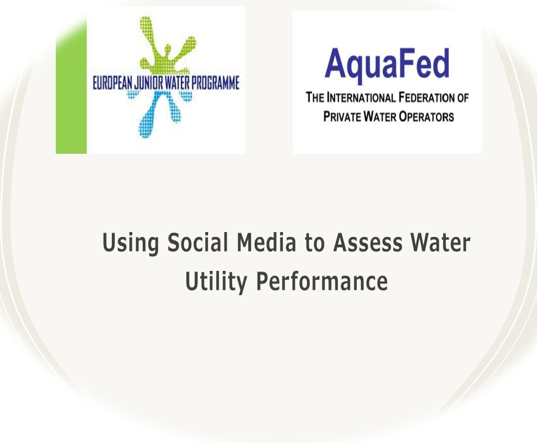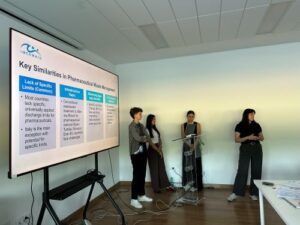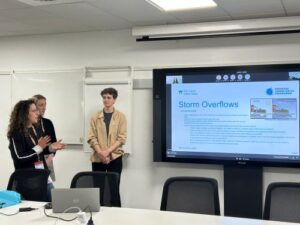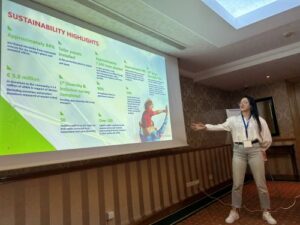Client: AquaFed
Period of project: 1 December – 28 March 2022
Participants: Nikolaos Mellios , Dimitris Kofinas, Mirela Sertić Perić, Lander Wantens , Isabella De Bok, Maureen Walschot
Project Description
AquaFed (the International Federation of Private Water Operators ) is missing data on the performance of its utilities, including the drinking water supply, wastewater and stormwater management chain. The goal of this project is to bridge the missing data on the activities and effectiveness of public-private partnerships (PPPs) in improving water utility performance using web-based information and social media. The project will propose a methodology for collecting, analysing, and mapping the missing data.
Approach
The project methodology was based on three steps. The first step was the creation of a questionnaire (in the form of GForms) asking for the public’s willingness to share valuable information about water supply, sanitation, water quality, aquatic biodiversity, and flood control. The second step was to analyze keywords related to water supply, wastewater, and stormwater management available on the EventRegistry platform, which tracks global events and analyzes their impacts. The third step was a desktop survey of the most common web scraping tools used to extract data from various web sources, including social media.
Questionnaire. The questionnaire consisted of 2 sections – the first contained questions through which we learned basic information about the questionnaire participants, and the second contained specific questions aimed at exploring respondents’ willingness to share valuable information about water supply, sanitation, water quality, aquatic biodiversity, flood control, and water supply pricing through social media. We forwarded the link to GForms to our acquaintances and on our social networks.
The questionnaire was completed by 114 respondents from a total of 12 countries. Most responses came from Croatia (44%), Greece (26%), Switzerland and Belgium (8% each), and the Netherlands (6%), but there were also some responses from the UK, Canada, Spain, Italy, India, Austria, and Colombia. Most responses were received from people aged 26-45 – about 25% of respondents are 36-40 years old, 20% are 26-30 years old, and 16% each are 31-35 and 41-45 years old. Most of our respondents have a tertiary education degree (68%), and a considerable number (29%) have a PhD. The majority (95%) are employed, although most of the employed respondents are not in the water sector (67%). 99% of respondents own a smartphone and use it daily, and a large majority (> 90%) have a social media account that they use daily (or weekly). The majority of respondents (about 70%) use social media to keep in touch with friends and family, to receive news and information, and to send instant messages. Many of them (about 50%) use social media to network professionally, get news about others, and share photos or videos. The most frequently used social networks are WhatsApp, Facebook and YouTube (used by about 70% of respondents), but Instagram and Viber also have a considerable number of followers (used by about 50% of respondents). Most of the respondents (55%) have very rarely seen information about water supply in social media. Only 11% of respondents have seen this information very often on social media and 12% never. Half of the respondents believe that social media should be used to disseminate information about water supply, sanitation, water quality, water supply pricing, aquatic biodiversity, and flood control. Although most respondents (44%) feel that social media would be a good place to share and receive news about water issues, only about 30% of respondents would join a social media group (e.g., Facebook) to receive information about water issues and/or use an app on their phone that contains information about these issues. Only 25% of respondents would like to receive updated information from their water provider via social media, while 35% of them would use social media to inform the water provider about water system/supply issues.
EventRegistry tool. The EventRegistry tool is a tool that searches the Internet for all articles and other entries that contain one or a set of selected keywords and groups them into events using AI. It can be used to set up an observation service that monitors the appearance of the searched keywords on the Internet in real time. While testing the EventRegistry tool with the relevant water-related keywords during this project, we concluded that some results may not be relevant and therefore experts are needed to monitor the keywords used for the search and verify the results. Another challenge is to translate the existing water topics into the searchable keywords.
Web scraping tools. Our search extracted top 5 best web scraping tools for data extraction from web: 1) Bright Data 2) Scrapingbee 3) Scraping Bot 4) Scraper API 5) Scrapestack.
Finally, we compared the pros and cons of social media vs. EventRegistry vs. web scraping tools and assessed their potential in improving water utility performance using web-based information and social media and connecting customers with water service providers. Here are our conclusions:
– Social media: provides information on actual end-user feedback and customer engagement, but is subjective and requires consent and privacy protection
– EventRegistry: uses AI to group events, adds meaningful filters based on more objective feedback, but cannot integrate social media data in its current form
– Web scraping tools: can integrate both web and social media feedback, but cannot be grouped into events and require predefinition of sources
Results
– In general, people are willing to share information about water supply, sanitation, water quality, aquatic biodiversity, flood control, and water supply pricing via social media
– Social media that can be used as a valuable source of customer feedback (and communication between customers and water utilities) include Facebook, WhatsApp, and YouTube
– Advanced AI-based technologies such as EventRegistry can provide insightful metadata analysis on water topics such as water supply, wastewater disposal, water quality, aquatic biodiversity, flood control, and water supply
– Customers should be advised to use social media platforms and/or a developed app to report water-related issues
– Social media, EventRegistry, and web scraping tools can be used in combination to take advantage of each. Experts need to be part of the entire process.






